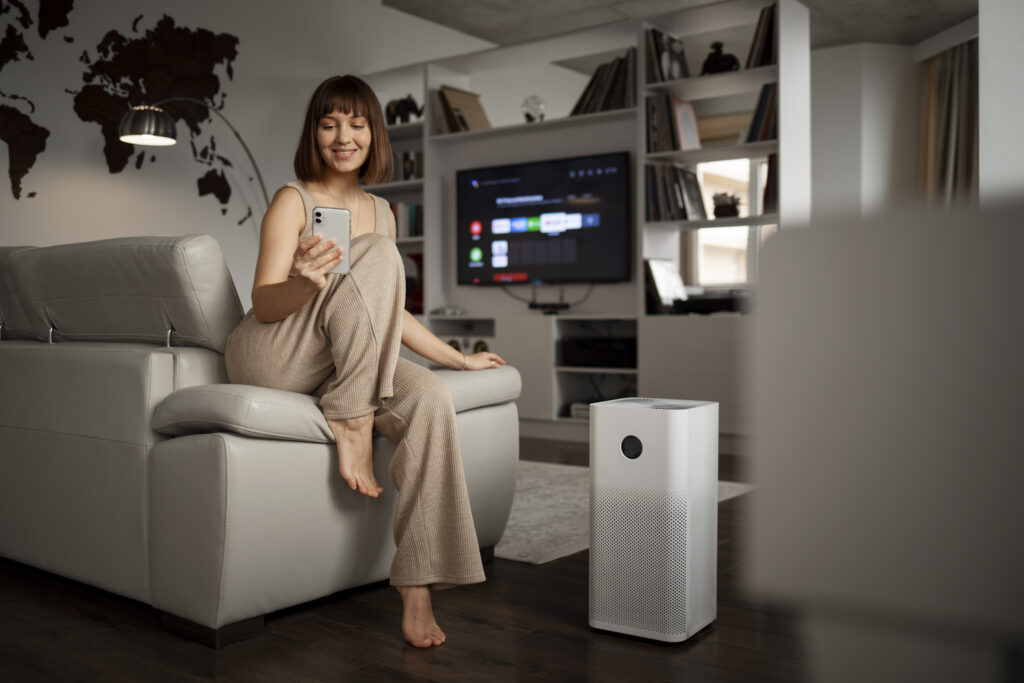Investing in an air purifier is a smart move if you want to improve the quality and health of the air in your house! However, it can be a little confusing to choose the best model and functionality for you because there are so many available. But don’t worry, we’re here to help you sort through the choices and pick the ideal air purifier for your requirements!

Common reasons people buy air purifiers include:
- Pollen, dust mites, and other allergens can be captured to help relieve allergies.
- An air purifier can help keep your furry companions’ dander at bay.
- Eliminating Odors: Certain air purifiers are excellent at getting rid of unpleasant scents, whether they come from cooking or smoke.
- Air quality can be improved by using purifiers that can filter out bacteria, viruses, and contaminants.
What to consider before selecting an air purifier.

1. Select the Appropriate Filter Type
- Various filters are used in air purifiers based on the kinds of particles they are most effective at removing:
- HEPA filters: If you have asthma or allergies, High-Efficiency Particulate Air (HEPA) filters are the best option for everyday use. They are made to catch 99.97% of particles that are at least 0.3 microns in size.
- Filters made of activated carbon are excellent at eliminating gases and odors. A good, activated carbon filter is a must for any air purifier if you’re worried about pet or smoke odors.
- UV-C Light: To eradicate bacteria and viruses, certain air purifiers employ UV light. Although it can provide an extra degree of security, not everyone needs this function.
- Ionizers: Charged ions released by ionizers cling to particle gases, making them sufficiently heavy to fall to the earth. Although some of them may release ozone, which can irritate delicate lungs, they are effective at eliminating particulates.
2. Dimensions and Area of Coverage
A certain room size is meant to be covered by each size of air purifier. Choose the purifier that best fits your room size by reading the description to find out its coverage area, which is usually stated in square feet or meters.
- Small room: Up to 200 sq. ft. (perfect for bedrooms)
- Medium room: 200–400 sq. ft.
- Large room: 400+ sq. ft. (for living rooms or open areas)
A bigger, whole-house model or more units would be required if you want whole-house coverage.
3. Level of Noise
Consider the noise level, particularly if you want to put the air purifier in a bedroom or office, as they frequently operate all day. Decibels (dB) are typically used to measure noise levels; if you want something quite enough not to bother you, seek one that is less than 50 dB.
If you value peaceful operation, search for the “sleep mode” option, which is a feature that many models include to lower the noise level at night.
4. Efficiency of Energy
Take into account your air purifier’s energy use if you intend to use it frequently. Certain purifiers have earned the Energy Star certification, indicating that they adhere to energy efficiency standards. Even if you use it often, choosing an energy-efficient model can help you save money on power bills.
5. Costs of Maintenance
The filters in air purifiers frequently need to be replaced for them to continue working effectively. Before buying, confirm: The price of changing a filter: How much does each filter cost, and how often should it be changed? Simplicity of replacement: Is changing the filter on your own easy?
Some models include permanent or washable filters, which might eventually save money even though they might not be as effective as HEPA filters.
6. Clever Features (If You Love Technology!)
App control, air quality sensors, and automated modifications based on air quality are examples of “smart” features that some air purifiers have. Although not necessary, these capabilities might simplify your life if you enjoy having remote control and monitoring of your air purifier.
7. Your Spending Limit
A decent air purifier doesn’t have to cost the earth. Choose a budget that suits you because there are solutions available at a variety of pricing levels. Purchasing a high-quality model frequently results in greater longevity and fewer filter replacements, but a higher price does not necessarily translate into better performance.
Conclusion
Selecting an air purifier doesn’t have to be difficult; start with the fundamentals: consider your primary reason for purchasing one, the size of the room, and your financial constraints. Next, choose a purifier with features that will suit your needs, such as an activated carbon filter for odors or a HEPA filter for allergens. An air purifier is a useful addition to your home, and with the right one, you’ll soon be breathing easier and enjoying cleaner air every day!





